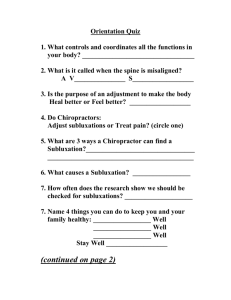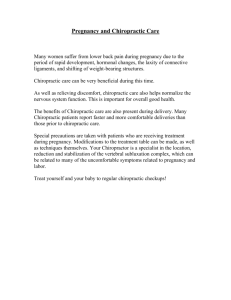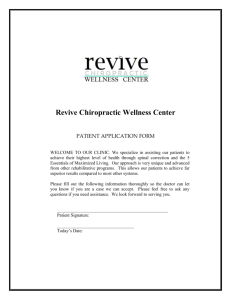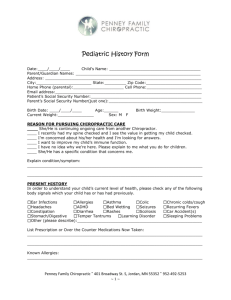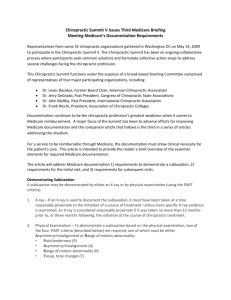Does the Subluxation Exist?
advertisement
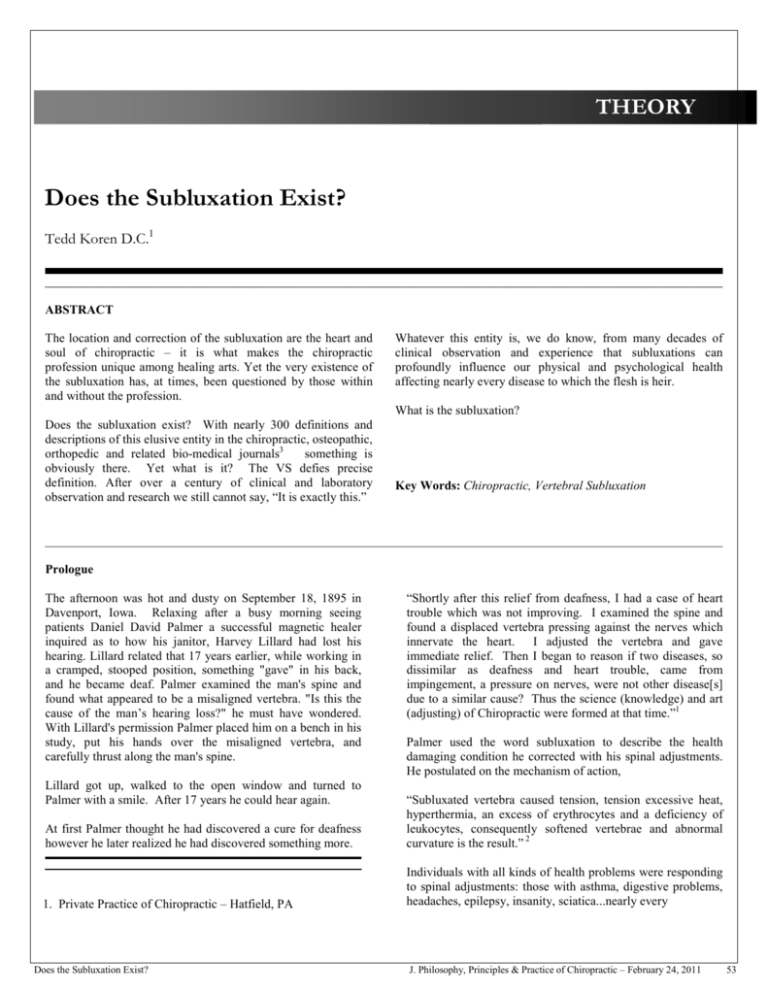
THEORY Does the Subluxation Exist? Tedd Koren D.C.1 __________________________________________________________________________________________ ABSTRACT The location and correction of the subluxation are the heart and soul of chiropractic – it is what makes the chiropractic profession unique among healing arts. Yet the very existence of the subluxation has, at times, been questioned by those within and without the profession. Whatever this entity is, we do know, from many decades of clinical observation and experience that subluxations can profoundly influence our physical and psychological health affecting nearly every disease to which the flesh is heir. What is the subluxation? Does the subluxation exist? With nearly 300 definitions and descriptions of this elusive entity in the chiropractic, osteopathic, orthopedic and related bio-medical journals3 something is obviously there. Yet what is it? The VS defies precise definition. After over a century of clinical and laboratory observation and research we still cannot say, “It is exactly this.” Key Words: Chiropractic, Vertebral Subluxation ____________________________________________________________________________________________________________ Prologue The afternoon was hot and dusty on September 18, 1895 in Davenport, Iowa. Relaxing after a busy morning seeing patients Daniel David Palmer a successful magnetic healer inquired as to how his janitor, Harvey Lillard had lost his hearing. Lillard related that 17 years earlier, while working in a cramped, stooped position, something "gave" in his back, and he became deaf. Palmer examined the man's spine and found what appeared to be a misaligned vertebra. "Is this the cause of the man’s hearing loss?" he must have wondered. With Lillard's permission Palmer placed him on a bench in his study, put his hands over the misaligned vertebra, and carefully thrust along the man's spine. Lillard got up, walked to the open window and turned to Palmer with a smile. After 17 years he could hear again. “Shortly after this relief from deafness, I had a case of heart trouble which was not improving. I examined the spine and found a displaced vertebra pressing against the nerves which innervate the heart. I adjusted the vertebra and gave immediate relief. Then I began to reason if two diseases, so dissimilar as deafness and heart trouble, came from impingement, a pressure on nerves, were not other disease[s] due to a similar cause? Thus the science (knowledge) and art (adjusting) of Chiropractic were formed at that time.”1 Palmer used the word subluxation to describe the health damaging condition he corrected with his spinal adjustments. He postulated on the mechanism of action, At first Palmer thought he had discovered a cure for deafness however he later realized he had discovered something more. “Subluxated vertebra caused tension, tension excessive heat, hyperthermia, an excess of erythrocytes and a deficiency of leukocytes, consequently softened vertebrae and abnormal curvature is the result.” 2 1. Private Practice of Chiropractic – Hatfield, PA Individuals with all kinds of health problems were responding to spinal adjustments: those with asthma, digestive problems, headaches, epilepsy, insanity, sciatica...nearly every Does the Subluxation Exist? J. Philosophy, Principles & Practice of Chiropractic – February 24, 2011 53 conceivable condition, were traveling far and wide to experience Dr. Palmer's new discovery. Part I: Introduction The location and correction of the subluxation are the heart and soul of chiropractic – it is what makes the chiropractic profession unique among healing arts. Yet the very existence of the subluxation has, at times, been questioned by those within and without the profession. Does the subluxation exist? With nearly 300 definitions and descriptions of this elusive entity in the chiropractic, osteopathic, orthopedic and related bio-medical journals3 something is obviously there. Yet what is it? The VS defies precise definition. After over a century of clinical and laboratory observation and research we still cannot say, “It is exactly this.” Whatever this entity is, we do know, from many decades of clinical observation and experience that subluxations can profoundly influence our physical and psychological health affecting nearly every disease to which the flesh is heir. What is the subluxation? The Abstractions of Life The gods love the obscure and hate the obvious. The Upanishads (800-500 BC) The subluxation cannot be precisely defined because it is an abstraction, an intellectual construct used by chiropractors, chiropractic researchers, educators and others to explain the success of the chiropractic adjustment. This is not a unique state of affairs, abstract entities populate many branches of science. Consider the gene. Like gravity the gene is a convenient tool invented to explain what Darwin in his writings referred to as “hereditary factors.” Science historian Nathaniel C. Comfort, in discussing the gene could easily have been discussing the vertebral subluxation: “The gene is…an invented concept. Our understanding of heredity as been propelled by the oscillations of a conceptual pendulum, arcing between the gene as a real entity and the gene as an abstraction…Little wonder, then, that some writers, such as the historian and philosopher of biology Evelyn Fox Keller have advocated scraping the term “gene” altogether, in favor of some term or set of terms to better express the dynamism of the chromosomes.”4 Consider gravity. Apples fall from trees so we invent the concept of gravity to describe the phenomenon. No one has seen gravity can isolate and observe it or directly measure it and no one knows how it works. It is an abstraction, part of a theory to describe the attraction between bodies with mass. Gravity’s existence is inferred; it is a useful concept. Psychiatry and psychology use abstract concepts such as the id, ego and superego to explain the workings of the mind. No 54 J. Philosophy, Principles & Practice of Chiropractic – February 24, 2011 one has ever seen an “id” or “ego” for example, yet these terms are convenient inventions. Similarly, physicists discuss “subatomic particles” in order to explain electromagnetic phenomena – objects that do not seem to exist within the realm of everyday time and space nor behave in ways we can easily define and whose very existence as physical realities are debated. Surely, life too, is an abstraction. “Life,” per se has never been isolated in a test tube. As Nobel Prize laureate AlbertSzent Gyorgy, MD, PhD. says in his beautiful essay (appropriately named), "What is life?": “Life in itself does not exist. No one has seen or measured life. Life is always linked to material systems; what man sees and measures are living systems of matter. Life is not a thing to be studied; rather, ‘being alive’ is a quality of some physical systems.”5 Subluxations, genes, gravity, the ego and life are all heuristic devices, “useful fictions” that are used to explain phenomenon that we do not fully understand. We use them as long as they work for us and discard or limit their application when they become unwieldy or unable to account for new observations. For example, the earth-centered theory of the solar system worked for many years but became unwieldy and was later replaced by the simpler sun-centered theory of the solar system; electromagnetic phenomena could not be explained by Newtonian theory and Newton’s work was replaced (or rather supplanted) by Einstein’s theory of relativity. Theories are useful tools and are needed by a scientific discipline, as medical historian Harris Coulter, Ph.D. writes, “Scientific method since Francis Bacon has proceeded by formulating hypotheses; as they are proven valid, theory emerges, and “facts” take on life and meaning. In the absence of an ordering hypothesis, “important” facts cannot be distinguished from “unimportant.” A science cannot develop and mature.”6 Critics of chiropractic have incorrectly assumed that chiropractic is based on the theory or principle that vertebral subluxations cause “pinched” nerves that cause disease. They have it backwards: chiropractic is not based on the theory of the subluxation but upon the success of the chiropractic adjustment. The empirical or clinical success came first, the theory attempting to explain the success of the adjustment such as nerve impingement, dis-ease, subluxations and others followed. Examples of such erroneous criticisms based on this strawman argument abound in the medical literature. Some examples: “The teachers, research workers and practitioners of medicine reject the so-called principle on which chiropractic is based and correctly and bluntly label it a fraud and hoax on the human race.”7 “The basis of chiropractic is completely unscientific.”8 The theory on which chiropractic is based [is false], namely that a "subluxation" of a spinal vertebra presses on a nerve interfering with the passage of energy down that nerve causing disease to organs supplied by that nerve, and that chiropractic "adjustments" can alleviate the pressure thereby treating or preventing such disease…there is no Does the Subluxation Exist? scientific evidence for the validity of this theory.9 To be fair, statements by some chiropractors have tended to perpetuate this misunderstanding: “Pressure on nerves causes irritation and tension with deranged functions as a result.”10 When chiropractors declare that “pinched nerves” “nerve impingement” “spinal fixations” or others mechanisms of action explain how subluxations affect the person and how chiropractic works they are making the same mistake medical critics make – assuming chiropractic is based on theory. Mechanisms and theories are useful tools, but their limitations should always be kept in mind. Vitalism to which chiropractic adheres. Unlike mechanists (rationalists) who believe the body can be understood using the tools of physics, mathematics, chemistry and mechanics, vitalists (empiricists) do not pretend to intellectually understand all that is occurring in the body. Instead vitalists realize that the best way we can discover the secrets about a marvelously complex physical/mental/spiritual entity is to observe it in sickness and health. It is impossible to really know all that is happening inside a living person at one time; to observe, record and make sense out of the millions of chemical, physical and emotional reactions that are going on inside a person every second is impossible. It has never been done. Bruno Kisch’ words are just as relevant today as when first written: So what is the scientific response to the question: “How does chiropractic work?” It is simply this: “We appear to understand some, but certainly not all of the mechanisms involved in the mechanisms of how subluxations affect the body. We don’t fully understand how chiropractic gets the results it does.” “The reduction of any vital processes exclusively to the laws of physics and chemistry has up to now not been efficient even in a single case…The modern vitalist will avoid the pretense the he can provide explanations for that which he in fact can only observe as existing.”13 We may never fully understand all the mechanisms of action. The same is true for homeopathy, acupuncture, psychology, and nearly all drugs presently prescribed by allopathic MDs. Palmer did acknowledge this vitalistic truism: “Non-organic objects and inanimate power do not illustrate or explain intellectual organic vital forces.”14 Can We Isolate a Subluxation? This danger of attempting to reduce living systems to mechanistic laws (biological reductionism) is wonderfully expressed by Dr. Gyorgy: Most mistakes in philosophy and logic occur because the human mind is apt to take the symbol for the reality. Albert Einstein We cannot isolate the subluxation in a test tube. To paraphrase Dr. Szent Gyorgy: The subluxation is not a thing to be studied; rather, “being subluxated” is a quality of some physical systems. The subluxation is unique to living things; it cannot be separated from the living body. If we try to isolate what we consider the physical structure of the subluxation we would not be looking at a subluxation but the corpse of an abstraction. As we study living things we risk denaturing and destroying them. For example, researchers take parts of people or animals – cells, tissues or organs and separate them from the body. They slice, stain, shine light, x-ray or use other imaging devices to observe the parts. Similarly researchers separate entire organisms from their normal social and ecological environment and bring them into laboratories containing many variables that may affect their function: diet, temperature, pressure, sounds, smells, radiations and social support and alter their normal function. For example, it was discovered that simply holding and petting an experimental rabbit brought forth different physiological outcomes than that of one not held and petted 11 and changing the diet of bacteria can affect genetic expression.12 Living things are simply too complex to treat them like elaborate mechanical devices that can be taken apart to be understood. “As scientists attempt to understand a living system, they move down from dimension to dimension, from one level of complexity to the next lower level. I followed this course in my own studies. I went from anatomy to the study of tissues, then to electron microscopy and chemistry, and finally to quantum mechanics. This downward journey through the scale of dimensions has its irony, for in my search for the secret of life, I ended up with atoms and electrons, which have no life at all. Somewhere along the line life has run out through my fingers. So, in my old age, I am now retracing my steps, trying to fight my way back…”15 In our attempt to reduce the subluxation to measurable mechanistic concepts we risk losing the person that has the subluxation. What Exactly Do Chiropractors Do? What exactly are chiropractors doing when they look for “subluxations” in patients? First the doctor performs an analysis using various tools and techniques: palpation of the spine and body structure, analysis of motion, posture, leg length, muscle strength, electromyelograpy, biofeedback, temperature differentials, muscle or blood flow asymmetries, symptomatic and/or other physiological changes and determines if a subluxation is present. However the chiropractor, using all these tools is not really viewing a subluxation. Instead he/she is observing what is believed to be some of its effects. This is consistent with the philosophy of Empiricism or Does the Subluxation Exist? J. Philosophy, Principles & Practice of Chiropractic – February 24, 2011 55 After determining that there is a “subluxation” a chiropractic adjustment (a force) is introduced into the patient’s body to correct the “subluxation.” After the adjustment the patient is re-analyzed and if certain physiological changes are found we infer that a subluxation has been corrected or reduced. Is there a way to study the effects of the subluxation, and its correction on the whole person? The best tool for this endeavor, we believe, is the outcome study. But has it? Our “adjustment” has made changes to the body but can we conclude that the subluxation, whatever it is, has been corrected? Perhaps the subluxation was suppressed or displaced to surface somewhere else where it will cause problems in a different part of the body/mind? Has the most superficial subluxation been corrected while others lie dormant? Will the superficial manifestation of the subluxation return because its deeper roots have been unaffected? In an outcome study you take an individual or individuals and do something to them (referred to as an "intervention"). The intervention could be a drug, a vitamin, an herb, surgery, a diet, an exercise regimen, a chiropractic adjustment or anything else. Those receiving the intervention are observed for any changes in their physical/emotional/spiritual health. Is the subluxation located solely in the physical body? Is the physical subluxation secondary to an energetic/emotional/spiritual “subluxation?” Could what we refer to as a subluxation be the physical manifestation of an emotional imbalance, a brain/mind dysfunction, a spiritual or a subtle energy disharmony? This is a fine area for study and work is being done here. For example, the chiropractic analysis and adjusting technique known as Neuro Emotional Technique (NET) developed by Scott Walker, DC (derived in part from Victor Frank, DC and Robert Ridler’s work) shows that by approaching the subluxation from an emotional perspective significant spinal, physiological and psychological changes may occur, often after physical adjustments had been previously unsuccessful.16 Another area for study is from the findings of Koren Specific Technique (KST). Clinical practitioners of KST observe that as a person changes posture (either physically or emotionally) they become subluxated in a unique manner. This is referred to as the Posture of Subluxation (POS). Philosophy Directs Intellectual Enquiry Vitalism/Empiricism tells us that we cannot observe all of the adjustment’s effects on the patient because the body/mind is too complex and fluid to be fully understood. We are forced to pick some things to observe: postural changes, symptom reduction or change, increased range of motion, blood pressure changes, body chemistry changes, personality changes, vision changes, instrumentation changes – a limited number of signs and symptoms – and we compare them to the “pre-adjustment” state. We cannot see the “subluxation” or the “adjustment” independent of the physical, emotional, spiritual person where it resides. A living person is so complex we cannot see all the changes the subluxation causes and all the changes that occur as a result of the “adjustment.” We are forced to look at parts and pieces. Guided by our philosophy our perception of the subluxation and the adjustment (and chiropractic) will be wide or narrow. Like the blind men touching the elephant we may create research studies showing that certain diseases respond to subluxation correction and erroneously conclude that subluxations are a “cause” of some conditions and can be “treated” with spinal adjustments. 56 J. Philosophy, Principles & Practice of Chiropractic – February 24, 2011 Outcome Studies Outcome studies seem like fishing expeditions – we look for as many things as possible, not knowing what we’ll find. There are a few chiropractic outcome studies; they reveal that chiropractic subluxation correction may have a profound effect on many aspects of a person. Examples include: In a British study, chiropractic patients' most dramatic improvements were associated not only with pain reduction but with quality of life factors such as sitting more comfortably, sleeping better, lifting, walking, standing, sex life, social life and ability to travel.17 In a study of 2,818 patients under Network Spinal Analysis (chiropractic) care significant improvements in physical health and mental/emotional health were observed. Patients also reported feeling less stress in their lives and more life enjoyment. These benefits became evident as early as 1-3 months under care, and showed continuing improvement as long as patients stayed under care with no indication of a maximum clinical benefit.18 In another study of Network Spinal Analysis of 89 patients under care for five months, improvements were reported in their physical health, mental/emotional health and overall wellness. 19 In two studies of 153 and 311 chiropractic patients who initially suffered musculoskeletal complaints, as they continued care they experienced an improvement in their perception of health and well being including general health, vitality and social functioning.20, 21 In an Italian study of 17,142 chiropractic patients from 22 clinics, chiropractic patients had 55-75% less absences from work. The study concluded: "A most meaningful indicator of the effectiveness of chiropractic is the improvement it produces in the quality of life, not only because of its curative effect but also thanks to its preventative and rehabilitative functions."22 A study of men and women 75 years and older revealed that those visiting chiropractors had better overall health and a higher quality of life. Chiropractic patients reported better overall health, fewer chronic conditions and fewer days spent in nursing homes and hospitals. They were also more mobile in their communities and were less likely to use prescription drugs than non-chiropractic patients. 87% of chiropractic patients described their health as excellent compared to 67.8% of non-chiropractic patients.23 Does the Subluxation Exist? Sacrificing Facts for Politics The dehumanized treatment of symptoms rather than patients has alienated many. Robert Becker, MD We must not limit our research to the dictates of politics, fashion or third party payments. If we hang on to the belief that subluxations are a uniquely physical phenomenon that can be understood by observing physical parts, rather than the whole person, we risk wasting a lot of resources limiting our profession’s potential. We will limit chiropractic’s message to humanity. What we are looking for will, in the words of Dr. Gyorgy “run out through [our] fingers.” Much of present day chiropractic research and practice ignores the “holistic” effects of the subluxation. This tendency to ignore the physical/mental/spiritual whole is bemoaned by pathologist William Boyd, M.D.: “Medicine can never be purely a science; it contains too many immeasurables. The patient with heart disease is not just an internal combustion engine with a leaking valve but a sensitive human being with a diseased heart. Disease in man is never exactly the same as disease in the experimental animal, for in man the emotions come into play. It may be the man or woman rather than the disease that needs to be treated. There is always the psyche to be considered as well as the soma.”24 Shall we limit our care to individuals suffering from certain conditions rather than to all those with a body that have the potential to develop subluxations? As we dehumanize our patients, seeing them as a collection of body parts, signs and symptoms rather than a whole person, we risk dehumanizing ourselves. Part 2 Can we “Prove” the Subluxation Exists? How do we prove the subluxation exists? How does one prove an abstract concept? The nature of the subluxation can best be revealed is in accordance with the vitalistic or Empirical tradition. We observe how a person functions in health and dis-ease rather than dissecting body parts. Coulter’s discussion of empiricism vis-à-vis homeopathy just as easily pertains to chiropractic, “Empirics (empiricists or vitalists) had always maintained that the physician could not have reliable information about invisible internal processes or mechanisms and should not attempt to base therapeutic procedures on mere assumptions. For if the patient’s vitality is always reacting dynamically to specific morbific impulses impinging on it from the outside, these internal processes are continually in flux, and stable or reliable knowledge of them cannot be had. Knowledge of physiological and pathological “processes” and “mechanisms” is necessarily “average,” while the vital force of each patient operates in its own specific way. Hence “average” knowledge of internal processes is never sufficiently reliable to guide the physician in a given concrete case. That is why homeopathic physicians have been reluctant to describe with too much assurance the precise nature of the Does the Subluxation Exist? pathophysiological mechanism symptoms picture…. underlying the patient’s The doctrine of the “visible” is linked to the concept of treating the “whole organism.” For the whole body is prior to all particular manifestations. The state of the whole body determines morbid processes in the interior, and the state of the whole body can be read only from the symptoms manifested by the whole body. The homeopathic physician seeks the laws and regularities of life, not in the intimate recesses of the patient’s organism, not at the submolecular level of the tissues, but right on the surface.”25 In a similar vein, we learn about how the VS and its correction affect human physiology and psychology by observing subluxated patients before and after adjustments. We scientifically “prove” subluxation correction with every success in our practice. The benefits of chiropractic subluxation correction are “proven” when we give an adjustment and a baby no longer has colic or nursing problems, vision improves, when digestion or elimination improves, hyperactivity decreases, depression lifts, low back pain resolves, hearing returns or “incurable” diseases resolve. We have over a century of such observation – observations that are much more useful than the methodologically grotesque and wasteful controlled clinical trials and animal studies so beloved by the medical-pharmaceutical complex. We must do what every great scientist does: observe. Observe with fresh eyes, with a vision unpolluted by dogma, assumptions and prejudice. We merely observe the subluxation’s effects and the response to the body when an adjustment is performed. In that way we can better understand how a subluxation affects mind/body/spiritual health and the best techniques for dealing with subluxations. Today we have far more tools to aid us than DD Palmer could have dreamed of: X-ray and imaging modalities such as MRI, CT and PET scans that are revealing body physiology in formerly inaccessible places. We can monitor blood pressure, pulse, heart rate variability, leg checks, ECG, respiration, skin radiation, body balance, subjective and objective symptoms, posture, gait and range of motion, palpation, EEG, biofeedback, vision and hearing, craniosacral rhythms, meningeal tension, cerebral spinal fluid (CSF) flow, blood/urine analyses, autonomic function, neurologic and orthopedic tests, a variety of psychological tests and other means to assess the changes in physiology before and after an adjustment. Yet these tools are useless or of limited value if we do not have a philosophy that engenders openness and creative thinking guiding our observations. That is why we should not ignore the subtle tools from the Chinese and Ayurvedic medical traditions that have been developed to analyze a patient’s health. For example, in those systems each person has many pulses in each wrist. Each pulse corresponds to certain meridians or energy pathways associated with internal organ systems and emotions. Each pulse has many qualities that are significant. These systems also analyze subtleties in a patient’s voice, body odor and J. Philosophy, Principles & Practice of Chiropractic – February 24, 2011 57 facial color. Such a system makes Western medicine look primitive by comparison. Other tools may include studying the location of energy cysts which are believed to be pockets of trapped or unresolved emotional energy that can be detected and released by trained practitioners.26 Auras or energy patterns that only highly skilled or naturally sensitive individuals can detect may prove valuable in subluxation research since the subluxation may affect body energies we have yet to discover. In addition the subluxation is not solely a physical condition but is partially non-physical or immaterial – the interference with the transmission of mental impulses which involves the level of consciousness. The emerging science of energy medicine may help us understand this aspect of the subluxation. These and many other tools may help us better understand the physiology of the subluxated individual and help tell us if a subluxation has been corrected. What is laughed at today may be the dogma of tomorrow. Chiropractic must protect its Vitalistic or Empirical roots or it risks becoming as sterile, intellectually barren and dangerous as modern allopathic medicine has become. As Bernie Siegel, M.D. author of Love, Medicine and Miracles says, “If you think your path in life must be logical, then you are path-ological.” Orthopedic surgeon Robert Becker MD, reminds us of the intangible nature of life, disease and health. “The healer’s job has always been to release something not understood, to remove obstructions…between the sick patient and the force of life driving obscurely towards wholeness…The gulf between folk therapy and our own stainless-steel version is illusory. Western medicine springs from the same roots and, in the final analysis, acts through the same little-understood forces as its country cousins. Our doctors ignore this kinship at their-and worse, their patients’peril. All worthwhile medical research and every medicine man’s intuition is part of the same quest for knowledge of the same elusive healing energy.”27 Healing is magical, mysterious, and wondrous. It is a physical, emotional, spiritual journey that both doctor and patient are on. Unrestricted by intellectual dogma or scientism, we discover the laws of life by studying living things functioning in health and disease, subluxated and unsubluxated. As DD Palmer learned from his patients so may we may make wondrous discoveries learning from ours. The most beautiful thing we can experience is the mysterious. It is the source of all true art and all science. Those to whom this emotion is a stranger, who can no longer pause to wonder and stand rapt in awe are as good as dead; their eyes are closed. Albert Einstein References 1. 2. 58 D.D. Palmer, The Science, Art and Philosophy of Chiropractic. 1910 Portland Printing House: Portland pp. 18-19. Ibid p. 15 J. Philosophy, Principles & Practice of Chiropractic – February 24, 2011 3. 4. 5. 6. 7. 8. 9. 10. 11. 12. 13. 14. 15. 16. 17. 18. 19. 20. 21. 22. 23. 24. 25. 26. 27. Rome PL. Usage of chiropractic terminology in the literature: 296 ways to say “subluxation”: complex issues of the vertebral subluxation. Chiropractic Technique. 1996;8(2). Comfort, Nathaniel C. Are Genes Real? Natural History 6/01. Gyorgy A. “What is Life?” In The Physical Basis of Life. Del Mar, CA: CRM Books, 1972. Divided Legacy p. 627. Milton Halpern, MD in At Your Own Risk, The Case Against Chiropractic by Ralph Lee Smith Angrist A., New York State Journal of Medicine Chiropractic the Greatest Hoax of the Century? Ludmil Adam Chotkowski, MD FACP New England Novelty Books, Kensington, CT ISBN # 0-96578551-3. Palmer. Ibid. Nerem RM, Levesque MJ, Cornhill JF. Social environment as a factor in diet-induced atherosclerosis. Science. 1980 Jun 27;208(4451):1475-6 Cairns J, Overbaugh J, Miller S The origin of mutants Nature 1988 Vol 335 pp. 142-145. Kisch, Bruno. “What Keeps Man Alive?” In C.M. Brooks and P. Cranefield, The Historical Development of Physiological Thought. New York: Hafner, 1959 DD Palmer ibid p.16 Gyorgy Ibid p.5. Scott Walker, NET Meade TW. Follow-up to Meade Study. British Medical Journal. August 5, 1995. Blanks RHI, Schuster TL. A retrospective assessment of network care using a survey of self-rated health, wellness and quality of life. JVSR. 1997;1(4). Marino MJ, Phillippa ML. A longitudinal assessment of chiropractic care using a survey of self-rated health wellness & quality of life: a preliminary study. Journal of Vertebral Subluxation Research. 1999;3(2). Owens EF, Hoiriis KT, Burd D. Changes in general health status during upper cervical chiropractic care: PBR report. Chiropractic Research Journal. 1998;V(1). Hoiriis KT, Owens EF. Changes in general health status during upper cervical chiropractic care: a practice-based research project update. Chiropractic Research Journal. 1999;Vl(2). Splendori F. Chiropractic-therapeutical effectivenesssocial importance. Incidence of absence from work and hospitalization. Survey on a sample of 17,142 patients, Italy, 1987. Study associates chiropractic with better health in the elderly. Today's Chiropractic. November/December 1996. Boyd W. A Textbook of Pathology. Seventh Edition. Philadelphia: Lea & Febiger, p. 5. Ibid. Coulter P. 248-249 Upledger J. Somatoemotional Release and Beyond. Palm Beach Gardens, FL: UI Publishing Co, 1990. Becker RO, Seldon G. The Body Electric. New York: William Morrow and Company, Inc., 1985;.29. Does the Subluxation Exist?
